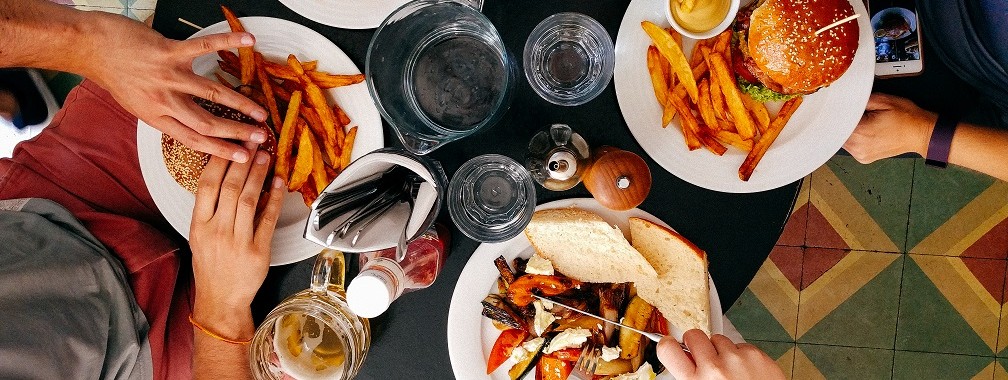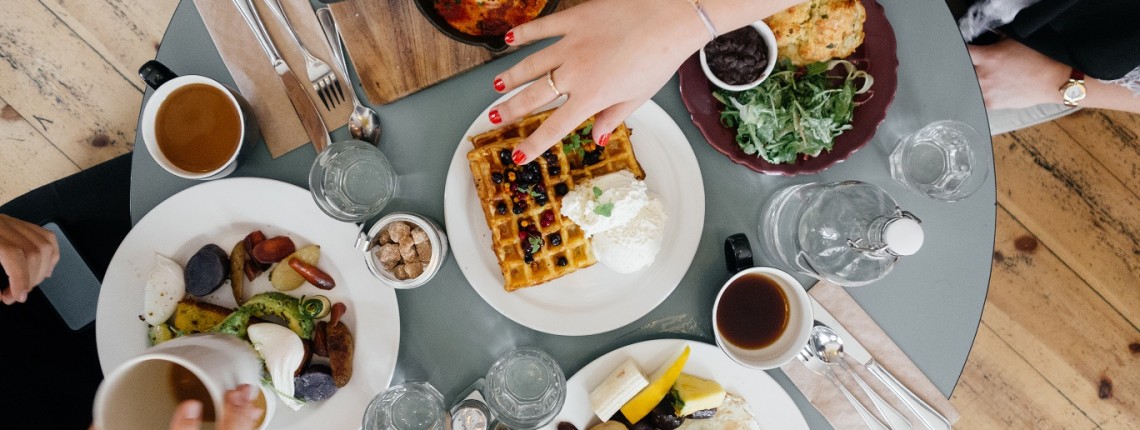Eating out


Eating out
Many celiac patients hesitate about eating out because restaurants use gluten in the preparation of their meals. Gluten commonly appears in many basic cooking ingredients, such as soup mixes, various sauces, breadcrumbs, etc. Gluten contamination from other dishes, cooking or serving utensils may occur in restaurants even when gluten is not directly involved in the preparation of a specific dish. Although many restaurants nowadays offer gluten-free foods, celiac patients still consider eating out an activity that requires advance preparation and necessitates careful planning. A simple dinner or lunch away from home can become a major undertaking. In fact, celiac patients currently have two options to choose from whenever they want to eat out:
The safe option: order your meal ahead of time
As a rule, celiac patients can benefit from making advance reservations at restaurants. When doing so, inquire about the ingredients of each dish you plan to eat. Restaurant staff is often unaware of the complexity of celiac disease and therefore, a thorough investigation is required: what soup mix, spices and sauces are used to prepare the meal. If and whenever possible, celiac patients should ask to remove the problematic elements from the dish they plan to order, or to replace them with "safe", gluten-free ingredients. For example, ask if corn flour can be used rather than wheat flour. Sometimes, an easier option is to ask to change the way the dish is prepared. For instance, asking for a baked burger could help to avoid contamination by gluten remaining in the frying oil from previously fried food.
The spontaneous "spur of the moment" option
If, without taking health risks, celiac patients want to be spontaneous and not book ahead, they should opt for a vegan or vegetarian restaurant. Asian cuisine is also a preferred choice, as Oriental restaurants use a lot of rice, rice noodles and tofu instead of wheat-based products. However, at these restaurants, it is important to order only dishes that do not contain gluten, without giving up the authentic experience. For example, to eat dishes without the traditional soy sauce, because it contains gluten, and should therefore ebe avoided. It is also advisable to inform the restaurant staff that you are gluten-sensitive, and try to gain their cooperation and consideration.
- Check with the restaurant to ascertain the presence or lack of gluten in dishes.
- If you are gluten-sensitive, this "spontaneous" option is not recommended, especially if the restaurant is unable to confirm what the ingredients in the dish are, or to assure you that it is fully responsible that there is no risk of secondary contamination by gluten.
One more suggestion: the easy option
At present, no restaurant in Israel has a gluten-free certified standard from the Ministry of Health. So, to avoid dilemmas that could have medical implications, you should know that there are restaurants that carry gluten-free dishes, which, for example, can be found in the following:
- http://www.bligluten.co.il/customsearch/home
- http://www.mouse.co.il/Tags/20033.aspx
- http://www.goodiz.tv/gluten-free-restaurants-in-israel/
- http://www.haaretz.co.il/food/.premium-1.2627304
- http://www.rest.co.il/rests?tags=i70025132
Many hotels throughout the country also regularly include gluten-free foods in their menus. This is particularly true for hotel chains in major cities, such as the Isrotel chain that has 15 hotels throughout Israel, and the Astral chain, which runs five hotels in Eilat. In addition, dozens of vacation rentals, known as Zimmer or B&B, offer gluten-free food, so you can choose the best and most suitable ones for you from the following list:
http://www.zimmer.co.il/gluten/
http://www.gf-travelguide.org.il/page.asp?pageID=522
Please note: The information provided above does not guarantee the accuracy of the claim that there is no gluten in the food. Therefore, it is always recommended to call before arrival and double-check.
Summary
Whether planned or spontaneous, eating out should be a positive experience. As a rule, check that the silverware you are given is spotless; if not, do not be embarrassed to ask for it to be replaced. You can also use disposable cutlery, or at Oriental-Asian restaurants, disposable chopsticks. Always remember that even at restaurants that are generally suitable for celiac patients, the kitchen is not "sterile", so there is always some risk of gluten contamination. In fact, even during a dinner carefully planned in advance, you might not feel fully relaxed and enjoy your meal, but at least you will not feel totally excluded. And for that, in itself, it is worth dining out...
Eating out
Many celiac patients hesitate about eating out because restaurants use gluten in the preparation of their meals. Gluten commonly appears in many basic cooking ingredients, such as soup mixes, various sauces, breadcrumbs, etc. Gluten contamination from other dishes, cooking or serving utensils may occur in restaurants even when gluten is not directly involved in the preparation of a specific dish. Although many restaurants nowadays offer gluten-free foods, celiac patients still consider eating out an activity that requires advance preparation and necessitates careful planning. A simple dinner or lunch away from home can become a major undertaking. In fact, celiac patients currently have two options to choose from whenever they want to eat out:
The safe option: order your meal ahead of time
As a rule, celiac patients can benefit from making advance reservations at restaurants. When doing so, inquire about the ingredients of each dish you plan to eat. Restaurant staff is often unaware of the complexity of celiac disease and therefore, a thorough investigation is required: what soup mix, spices and sauces are used to prepare the meal. If and whenever possible, celiac patients should ask to remove the problematic elements from the dish they plan to order, or to replace them with "safe", gluten-free ingredients. For example, ask if corn flour can be used rather than wheat flour. Sometimes, an easier option is to ask to change the way the dish is prepared. For instance, asking for a baked burger could help to avoid contamination by gluten remaining in the frying oil from previously fried food.
The spontaneous "spur of the moment" option
If, without taking health risks, celiac patients want to be spontaneous and not book ahead, they should opt for a vegan or vegetarian restaurant. Asian cuisine is also a preferred choice, as Oriental restaurants use a lot of rice, rice noodles and tofu instead of wheat-based products. However, at these restaurants, it is important to order only dishes that do not contain gluten, without giving up the authentic experience. For example, to eat dishes without the traditional soy sauce, because it contains gluten, and should therefore ebe avoided. It is also advisable to inform the restaurant staff that you are gluten-sensitive, and try to gain their cooperation and consideration.
- Check with the restaurant to ascertain the presence or lack of gluten in dishes.
- If you are gluten-sensitive, this "spontaneous" option is not recommended, especially if the restaurant is unable to confirm what the ingredients in the dish are, or to assure you that it is fully responsible that there is no risk of secondary contamination by gluten.
One more suggestion: the easy option
At present, no restaurant in Israel has a gluten-free certified standard from the Ministry of Health. So, to avoid dilemmas that could have medical implications, you should know that there are restaurants that carry gluten-free dishes, which, for example, can be found in the following:
- http://www.bligluten.co.il/customsearch/home
- http://www.mouse.co.il/Tags/20033.aspx
- http://www.goodiz.tv/gluten-free-restaurants-in-israel/
- http://www.haaretz.co.il/food/.premium-1.2627304
- http://www.rest.co.il/rests?tags=i70025132
Many hotels throughout the country also regularly include gluten-free foods in their menus. This is particularly true for hotel chains in major cities, such as the Isrotel chain that has 15 hotels throughout Israel, and the Astral chain, which runs five hotels in Eilat. In addition, dozens of vacation rentals, known as Zimmer or B&B, offer gluten-free food, so you can choose the best and most suitable ones for you from the following list:
http://www.zimmer.co.il/gluten/
http://www.gf-travelguide.org.il/page.asp?pageID=522
Please note: The information provided above does not guarantee the accuracy of the claim that there is no gluten in the food. Therefore, it is always recommended to call before arrival and double-check.
Summary
Whether planned or spontaneous, eating out should be a positive experience. As a rule, check that the silverware you are given is spotless; if not, do not be embarrassed to ask for it to be replaced. You can also use disposable cutlery, or at Oriental-Asian restaurants, disposable chopsticks. Always remember that even at restaurants that are generally suitable for celiac patients, the kitchen is not "sterile", so there is always some risk of gluten contamination. In fact, even during a dinner carefully planned in advance, you might not feel fully relaxed and enjoy your meal, but at least you will not feel totally excluded. And for that, in itself, it is worth dining out...
